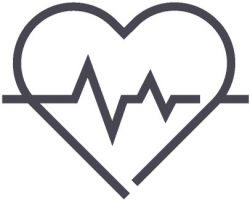Essential Hypertension
Essential Hypertension can be defined as raised blood pressure for which there is no identifiable cause. It develops over the years at a gradual pace. It is also called Primary Hypertension or Idiopathic Hypertension.
Comparison to Secondary Hypertension
Secondary Hypertension is triggered by an existing or prior medical condition. Unlike Primary (Essential) Hypertension that develops and builds over an extended period, Secondary Hypertension can occur suddenly. It causes higher pressure in the arteries than Essential Hypertension.
The most common medical conditions that can lead to Secondary Hypertension are:
- Kidney problems
- Diabetes
- Certain medications like birth control pills
- Congenital disabilities since birth
- Thyroid problems
Prevalence of cases worldwide
The World Health Organization (WHO) has estimated the number of people suffering from high blood pressure to be around 1.3 billion. That is almost two-thirds of the world population, meaning that it is a widespread and serious problem.
Of this number, only one in five people have the condition under control. This makes it a leading cause of premature deaths in the world.
Death Rates Associated with High Blood Pressure
WHO has put the mortality rate resulting from high blood pressure at 12.8% of all deaths. That’s around 7.5 million people yearly, succumbing to hypertension and related complications.
Causes of Essential Hypertension
Essential Hypertension is distinct due to the lack of an identifiable cause. However, particular risk factors have been identified:
- Obesity
With increased weight, the body needs more blood to transport oxygen to tissues and organs. As the amount of blood increases, it causes pressure in the blood vessels to increase as well. Therefore, weight issues can increase the chances of suffering from Essential Hypertension. - Genetics
Essential Hypertension is known to run in families. Researchers have identified up to 50 genes associated with high blood pressure. - Aging
The risk of suffering from Essential Hypertension increases as a person gets older. This may be due to the stiffening of artery walls. Men are at a higher risk after attaining the age of 64 while it is 65 years in women. - Stress
Some doctors have concluded that chronic or long-term mental stress increases the likelihood of a person developing Essential Hypertension. - High Salt intake, especially in salt-sensitive patients
Too much salt in the body can cause Primary Hypertension. It is because salt increases the retention of water in the blood, which will, in turn, increase the volume of blood in the vessels, resulting in hypertension. - Renin
This is an enzyme produced in the kidneys and is responsible for controlling blood pressure in the arteries. An increase or decrease in the levels of renin in the body puts a person at risk of getting Essential Hypertension. - High alcohol intake
The U.S Department of Health defines excessive consumption of alcohol as more than one drink daily for women and more than two drinks a day for men. Alcohol can damage the heart, which might lead to Essential Hypertension. - Sedentary lifestyle
This is a inactive lifestyle that involves little physical exercise. People who don’t exercise regularly have an increased risk of getting high blood pressure.
Symptoms of Essential Hypertension
The most common diagnostic factors associated with the condition include:
- Frequent headaches
- Chest pains
- Dyspnea (difficulty breathing)
- Visual changes or blurred vision
- Dizziness
- Some patients claim to have louder heartbeats
Risks from Hypertension
When the blood pressure is higher than average, the heart has to work harder to pump blood through the body. If left untreated, Essential Hypertension can lead to severe medical conditions and outcomes. The high pressure in blood vessels can damage organs, heart muscles and the blood vessels themselves. These issues can lead to:
- Atherosclerosis (hardening of the arteries due to cholesterol buildup)
- Heart failure and heart attack
- Stroke
- Nerve damage
- Eye damage
- Kidney damage
Essential Hypertension Treatments
The condition is manageable through the combination of a healthy lifestyle and medication.
Doctors usually recommend the following lifestyle changes:
- Eating healthy foods
- Engaging in increased physical activity and exercise
- Reducing alcohol and tobacco use
- Reducing salt intake and processed foods
- Reducing stress level through therapy
Medical Treatment of Essential Hypertension
Antihypertensive drugs are a class of drugs that are useful in managing Essential Hypertension. They seek to prevent the complications associated with high blood pressure, such as stroke and heart failure.
Drugs in this category include:
- Calcium channel blockers such as Clevidipine, Amlodipine, and Felodipine
- Beta-blockers like Metoprolol
- Angiotensin II receptor blockers/antagonists (ARBs), for example, Azilsartan, Candesartan, and Losartan
- Diuretics, especially Thiazide diuretics which include drugs such as Hydrochlorothiazide and Bendroflumethiazide
- Renin-inhibitors – Aliskiren is the most widely used renin inhibitor approved by the United States FDA
- Angiotensin-converting Enzyme inhibitors (ACE inhibitors) such as Fosinopril, Benazepril, Captopril, and Moexipril
Doctors can prescribe one or more of these drugs to treat and manage Essential Hypertension. Patients may respond positively to one, or several medications. By also managing hypertension through healthy living (diet and exercises), they can cut the intake of antihypertensive drugs.
Because the symptoms of Essential Hypertension are not readily observable, the best way to find out if you are at risk is by checking your blood pressure often at the doctor’s office, or at home. When diagnosed at an early stage, it becomes easier to manage the problem, therefore preventing the development of more severe complications.
Living a healthy lifestyle is the key to preventing Essential Hypertension from ever developing. Therefore, regular exercise, avoiding use of tobacco products, and reduced intake of alcohol are all vital in ensuring your heart remains healthy.
